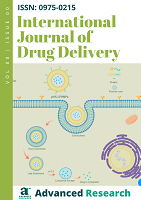Design and evaluation of mucoadhesive microspheres of repaglinide for oral controlled release
Keywords:
Controlled Release, Repaglinide, Solvent Evaporation, Microspheres, MucoadhesiveAbstract
Gastro retentive dosage forms have potential for use as controlledrelease drug delivery systems. Multiple unit systems avoid the “all-ornone gastric” emptying nature of single-unit systems. A controlled release system designed to increase its residence time in the stomach with contact with the mucosa was achieved through the preparation of mucoadhesive microspheres by the emulsion solvent evaporation technique consisting of (I) chitosan mucoadhesive (ii) repaglinide, an oral hypoglycemic agent; and (iii) Eudragit RS-100 as polymer. The microspheres were evaluated for surface morphology and particle shape by scanning electron microscope. The microspheres were also evaluated for their microencapsulation efficiency, in vitro wash-off mucoadhesion test, in vitro drug release and in vivo study. The microspheres were found to be spherical and free flowing. The microencapsulation efficiency was in the range of 61.44±1.16 to 79.90±1.17and microspheres exhibited good mucoadhesive property in the in vitro wash off test. The drug-polymer concentration of dispersed phase influences the particle size and drug release properties. All the formulations were followed by Matrix-Peppas model. The drug release was also found to be slow and extended for 24 h. In vivo testing of the mucoadhesive microspheres in diabetic albino rats demonstrated significant antidiabetic effect of repaglinide. The hypoglycemic effect obtained by mucoadhesive microspheres was for more than 16 whereas repaglinide produced an antidiabetic effect for only 10 h suggesting that mucoadhesive microspheres are a valuable system for the long term delivery of repaglinide.
References
Prajapati SK, Tripathi P, Ubaidulla U,
Anand V. Design and development of
Gliclazide Mucoadhesive Microspheres:
In Vitro and In Vivo Evaluation. AAPS
PharmSci Tech.2006;6:224-230.
Mahor S, Palani S, Joseph NM, Garud N.
Preparation and evaluation of
Gastroretentive microspheres of ranitidine
hydrochloride. Asian journal of
Pharmaceutics 2007;1:164-169.
Akiyama Y, Nagahara N. Novel
formulation approaches to oral
mucoadhesive drug delivery systems. in:
Mathiowitz E, Chickering III DE, Lehr
CM, (Eds.), Bioadheive Drug Delivery
Systems: Fundamentals, Novel
Approaches and Development, Marcel
Dekker, New York,1999;p.477–505.
Bakan JA, Microencapsulation. The
theory and practice of Industrial
pharmacy. Lachman IL, Liberman HA,
nd ed. Varghese, Mumbai,
India,1991;412-428.
Davis SN, Granner DK. Insulin, oral
hypoglycemic agents and the
pharmacology of the endocrine pancreas,
in: Hardman JG, Limbrid LE. Goodman
and Gilman’s The Pharmacological Basis
of Therapeutics. 10th ed. McGraw-Hill
Medica Publishing Division,
USA.2001;1704-1705.
Chowdary KPR, Srinivas L.
Mucoadhesive drug delivery systems: a
status of current review. Indian Drugs
;37:400-406.
Gupta R, Prajapati SK, Bhardwaj HP.
Formulation and evaluation of Glipizide
floating microspheres. Asian journal of
Pharmaceutics 2007;1:159-163.
Bogataj M, Mahor A, Korosec L.
Influence of physicochemical and
biological parameters on drug release
from microspheres adhered on vesicle and
intestinal mucosa. Int J Pharm.
;177:211-220.
Dhawan S, Singla AK, Sinha VR.
Evaluation of Mucoadhesive Properties of
Chitosan Microspheres. AAPS Journal
;5(4):1-7.
Jain SK, Awasthi AM, Jain NK, Agrawal
GP. Calcium silicate based microspheres
of Repaglinide for gastroretentive floating
drug delivery: Preparation and in vitro
characterization. J. Control Release
;107:300–309.
Mukhtar HM, Ansari SH, Ali M, Bhat
ZA, Naved T. Effect of aqueous extract of
Cyamopsis tetragonoloba linn. Beans on
blood glucose level in normal and
alloxan-induced diabetic rats. Indian J
Exp Biol 2006;42:101-105.
Cuna M, Alonso MJ, Torres D.
Preparation and in-vivo evaluation of
mucoadhesive micro-particles containing
Amoxicillin-resin complexes for drug
delivery to the gastric mucosa. Eur J.
Pharma Biopharma 2001;51:199-205.






